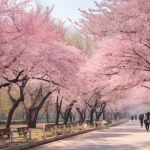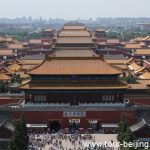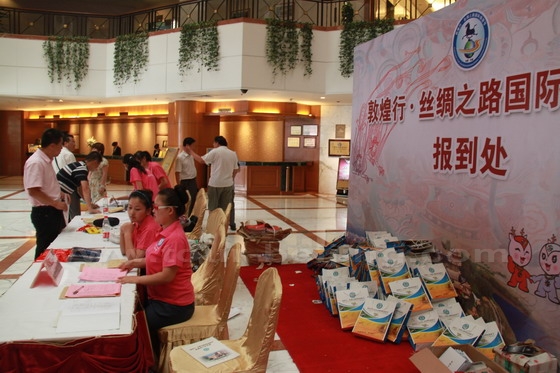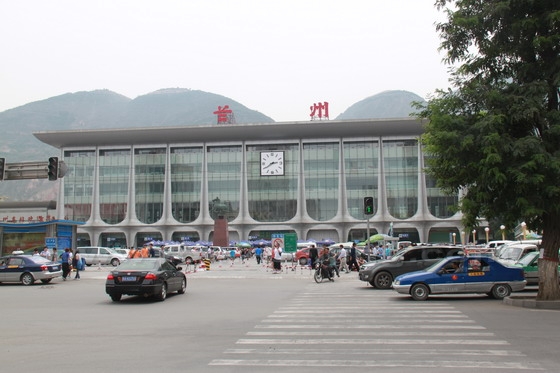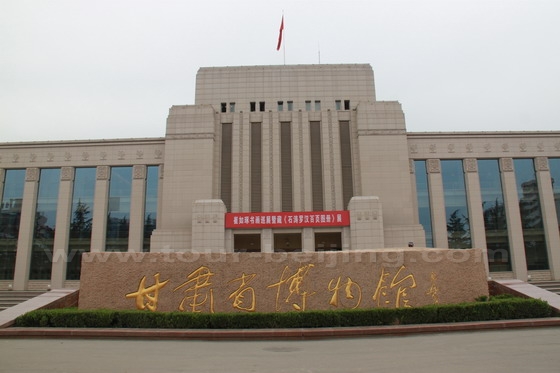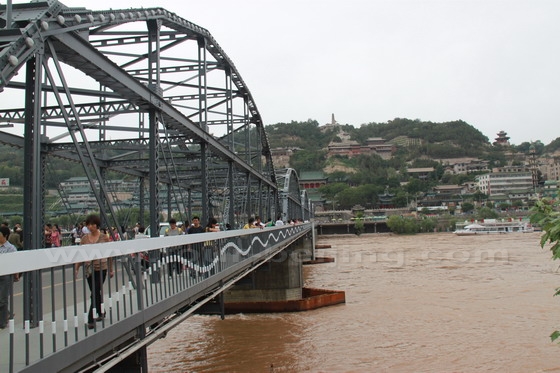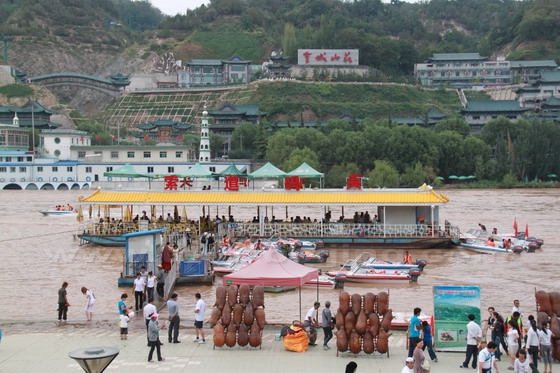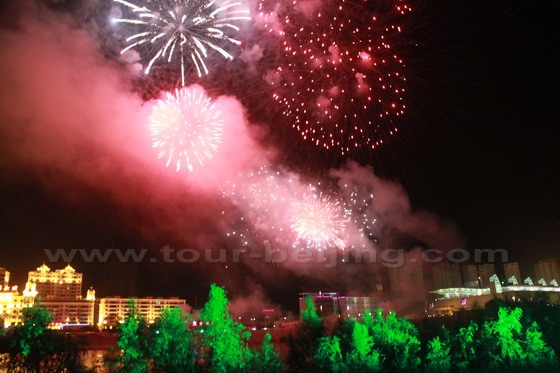Together with my co-worker Mr.Jonhy Hao, we took the 2 hour flight CA1273 for Lanzhou.
CA1273, an Air China flight was scheduled to take off at 07:20 and land at 09:35 at Lanzhou Zhongchuan Airport from Beijing. Basically there are about 9 daily flights running between Beijing and Lazhou, operated by Air China, Eastern China Airline, Hainan Airline.
For unknown reasons, our plane didn’t take off as scheduled till 8:00am. For most of our flight journey, our plane flew at the hight of 8400 meters and at the speed of 900 km per hour. Our plane picked up speed and finally we landed safe and smooth at Lanzhou Zhongchuan Airport.
In the course of the 2 hour flight, we were quite fascinated by the landscape below us, lush green mountains, then giving away to the boundless desert, leoss plateau and chocalet coloured Yellow River near Lanzhou.
Lanzhou Airport’s official name is Lanzhou Zhongchuan Airport. Lanzhou airport is about 70km north of the city of Lanzhou, the second furtherest airport from the downtown, just after Lhasa airport. Lanzhou airport is located in a plain of a valley on the loess plateau and on the fringe of Qinghai-Tibet Plateau, a major airport in the northwest China.
Lanhzou airport is well connected with the major cities in China like Beijing, Shanghai, Guangzhou, Shenzhen, Xian, Urumqi, Shenyang, Wuhan, Xiamen, Nanjing, Hangzhou, Chongqing, Fuzhou as well as the flights within Gansu Province to Jiayuguan and Dunhuang. It has also tourism charter flights to Hong Kong and international cities in Japan, Korea, Singapore and Malaysia.
The main terminal is a two-storey building with the arrival hall on the first floor and departure hall on the second floor.
If you prefer to take a shuttle bus from airport to the CAAC Office (just opposite to Jinjiang Sun Hotel) in the downtown of Lanzhou, you first buy your bus ticket in the waiting hall by the middle gate. RMB 30 for one shuttle bus ride going every half hour. The shuttel bus ride takes about 50 minutes.
Your bus is just outside the waiting hall. If you cannot see your shuttle bus, you have to wait for a while since the bus operates very half hour.
We had a private transfer arranged by the local tourim bureau. The car driver was a young man of few words. We didn’t talk much on the way from Lanzhou Airport to our lodging hotel in Lanzhou – Lanzhou Legend Hotel.
As the capital city of Gansu, one of the less developed provinces in China, Lanzhou doesn’t possess many luxury hotels. At the time of my writing, no international chain hotels are available in the city of Lanzhou.
Mid-range hotels, like 4 or 3 stars take a large share of the market in Lanzhou. In the past few years, Lanzhou has seen the fast growing of express hotels such Hanting Inn and Hotels, Jinjiang Inn, Home Inn, Green Tree Inn…
If you travel on a budget, these kinds of express hotels mentioned above are highly recommended. They are clean, cheap and equipped with in-house fast internet. If you don’t have your laptop on hand, you may go to the compact lobby, such as the lobby of Hanting Inns, they often put two free computers in the lobby for people to use, to surf and to print.
Our hotel – Lanzhou Legend Hotel is a 4 star hotel that most of the leisure or business travelers would like to choose to use for their first trip to Lanzhou. Lanzhou legend Hotel is centrally located at 599, Tianshui Road, Lanzhou, by the crossroad formed by north-south Tianshui Road and east -west Donggang Xilu.
Walk down to the south from Lanzhou Legend Hotel along Tianshui Road, you will soon get to Lanzhou Railway Station. The two Lanzhou bar streets – Gannan Road and Maijishan Road, are just one and two blocks south of Lanzhou Lengend Hotel.
Walk along Donggang Xilu, you soon pass by Jin Jiang Sun Hotel, then come across Dongfang Square, the heart of Lanzhou. Again you walk towards the west, soon you will be Qingyang Road, in which the 5 star hotel Gangsu Sunshine Hotel.
Our hotel address and phone number:
Post Code: 730000
Tel: 86-931-8532888
After check-in at Lanzhou Legend Hotel, we walked along the main avenue – Tianshui Road down to Lanzhou Railway Station for an inspection.
Lanzhou is a major transport, especially a railway hub in the western China. It has the following railway lines:
Longhai Railway Line:
To the east (Xian, Zhengzhou, Lianyungang), extending to Beijing, Shanghai…, the first railway line connecting Lanzhou (1953).
Lanxin Railway Line:
To the west and northwest linking the western Gansu and Urumqi, and further extending to other places in Xinjiang
and to Kazakhstan.
Lanqing Railway Line:
To the west and southwest, with direct train service connecting Xining and Lhasa.
A Train line linking to the north and northeast, with direct train connecting Yinchuan and Baotou.
The main railyway terminal is a two-storey building 171 meters long from east to west and 47.5 wide from north to south.
Then we hailed a cab and got to the Gansu Provincial Museum. Visiting Gansu Provincial Museum is a must for every foreign visitor coming to Lanzhou on their trip to the ancient Silk Road in China.
The Gansu Museum is a three-storey buidling with an area of 28000 square meters. The museum has an exhibition floor of 9000 square meters as well as a warehouse of 7600 square meters.
Every morning (Monday closed) only 600 visitors and every afternoon ( Monday closed) only 400 visitors are allowed to enter the musuem. If you travel on a group, your group have to reserve the tickets.
So you travel independently, you are advised to go to the museum a little bit earlier to avoid the possible crowds of tourists. Visitors have to go through security check before entry.
Crammed with the old Lanzhou and Gansu Province, we did need some fresh air and beautiful views to recharge ourselves.
The moment we walked out of the museum, we spotted a taxi and stopped the driver and went directly to the southern bank of the Yellow River to have a glimpse of the famous Zhongshan Bridge and the river itself.
The bridge was 234 meters long and 7.5 meters wide with 6 pillars and 5 steel arches. In 1907, at the suggestion of the local officials, with the support and help of the German businessman, Qing Government started to build the first bridge over the Yellow River. To commemorate Dr. Sun Yat-sen, the bridge was renamed Zhongshan Bridge (Dr. Sun Yat-sen’s bridge).
Yellow River is the second longest river in China estimated length of 5,464 kilometers after Yangtze River. Its headwaters of this mighty river originates from Kunlun Mountains in northwestern Qinghai Province, the west of China.
It winds its way passing nine provinces and autonomous regions – Qinghai, Gansu, Ningxia, Inner Mongolia, Shanxi, Shaanxi, Henan and Shandong, and finally empties into the Bohai Sea in the east of Shandong Province. Total basin area is 742,443 km².
It flows the Loess Plateau in its middle section and carrys large amount of sand on its way down to the lower reaches of the mighty river, making the river appearing yellow, hence the name of Yellow River.
We left the Yellow River area and returned to Lanzhou Legend Hotel for the banquet sponsored by the local Gansu Provincial Government. At 8:00pm we all boarded loads of buses for the Water Wheel Park by the southern bank of Yellow River where the ceremony was to be held.
This silk road tourism festival was said to be held for the first time in Gansu in terms of its size and importance. The tourism festival was hosted by China National Tourism Administration and Gansu Provicial People’s Government.
This Silk Road international tourism festival was aimed at speeding up the local tourism development, a big measure to realize the super-conventional and leaping development in Gansu. Through the tourism festival, hopefully it would improve and create a positive image of Gansu globally, hence greatly facilitating the social and economic development in Gansu.
Silk Road was the world’s first information superhighway, trading goods, exchanging different cultures and religions between China and Central Asia through the mountain and desert corridor of Gansu.
The ancient travelers, pilgrims, artists, soldiers and merchants had created a mixed culture and left behind a rich treasure troves – military garrisons, great wall, tombs and grottoes.
Gansu is also famous for its Tibetan culture and alpine grassland. Larang Monastery and Sangke Grassland are not to be missed. Some of the diverse people you may meet on your own including the Hui, Tibetans, Mongols, Dongxiang and Kazakhs.
Further Readings
Lanzhou Tour
Gansu Tour
Top 10 Attractions in Lanzhou
Top 10 Places in Gansu
How to Enjoy Nightlife in Lanzhou
Lanzhou Zhangye Road Pedestrian Street
Zhengning Road Night Snack Market in Lanzhou
Lanzhou Bar Street
Lanzhou Antique Market
Lanzhou Waterwheel Park
Lanzhou Zhongshan Bridge
Lanzhou City Layout
How to visit Gansu Museum
Lanzhou Yintan Wetland Park
Lanzhou Zhongchuan Airport
Lanzhou Railway Station
Lanzhou Xiguan Mosque
Where to stay in Lanzhou
Yellow River, the Mother River of China


